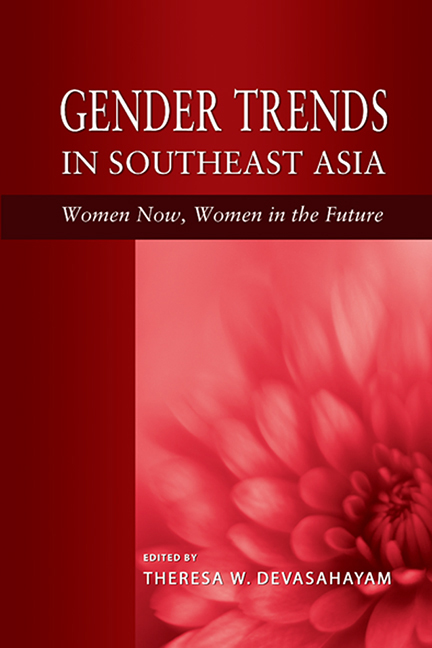Book contents
- Frontmatter
- Contents
- Contributors
- List of Tables and Figures
- Foreword
- Message
- Acknowledgements
- 1 Introduction: Women in Southeast Asia: Changes and Continuities
- 2 Women, Marriage and Family in Southeast Asia
- 3 Gender Trends in Migration and Employment in Southeast Asia
- 4 Has Gender Analysis been Mainstreamed in the Study of Southeast Asian Politics?
- 5 Gender Mainstreaming in Health: Mainstream or “Off-Stream”?
- 6 Politicization of Islam in Indonesia and Malaysia: Women's Rights and Inter-Religious Relations
- Index
Message
Published online by Cambridge University Press: 21 October 2015
- Frontmatter
- Contents
- Contributors
- List of Tables and Figures
- Foreword
- Message
- Acknowledgements
- 1 Introduction: Women in Southeast Asia: Changes and Continuities
- 2 Women, Marriage and Family in Southeast Asia
- 3 Gender Trends in Migration and Employment in Southeast Asia
- 4 Has Gender Analysis been Mainstreamed in the Study of Southeast Asian Politics?
- 5 Gender Mainstreaming in Health: Mainstream or “Off-Stream”?
- 6 Politicization of Islam in Indonesia and Malaysia: Women's Rights and Inter-Religious Relations
- Index
Summary
Thank you for giving me the opportunity to address you on a subject that has always been of special interest to me. I find each day of my work fulfilling as I am directly involved in advancing the interests of women in Singapore and things that women traditionally care a lot about, like family, children, marriage, parenting and even what women want men to do more of!
Politics
It is important to empower women to participate in decision-making at the community and national levels. The Singapore Government welcomes women to leadership positions based on meritocracy. In the domain of politics, for example, female representation in the Singapore Parliament has been increasing. Women make up 24.5 per cent of the Singapore Parliament today. This percentage exceeds the Inter-Parliamentary Union's world average of 18.3 per cent.
The number of women holding public office has increased, especially in local government, at the higher levels of political participation. For example, women in Lao PDR, Timor-Leste and Vietnam have prided themselves in holding more than 25 per cent of national parliamentary seats in 2007. Other Southeast Asian countries have between eight and 16 per cent of seats held by women in national parliament.
Employment
As gender equality is the goal adopted by the international community and national governments, people's rights, responsibilities, social status and access to resources should not depend on their gender. This includes employment opportunities for women as well as men.
According to the internationally agreed commitments under the International Labour Organization (or ILO), some key international labour conventions for gender equality include: discrimination in employment, equal remuneration, workers with family responsibilities and maternity protection. The ILO reports that in 2006, the female labour force participation rate (or LFPR) is lower than males in all the countries covered. Vietnam and Thailand has the highest LFPR at 72 and 66 per cent respectively. In comparison, the rate for other Southeast Asian countries are below or around 50 per cent.
- Type
- Chapter
- Information
- Gender Trends in Southeast AsiaWomen Now, Women in the Future, pp. xiii - xviPublisher: ISEAS–Yusof Ishak InstitutePrint publication year: 2009

